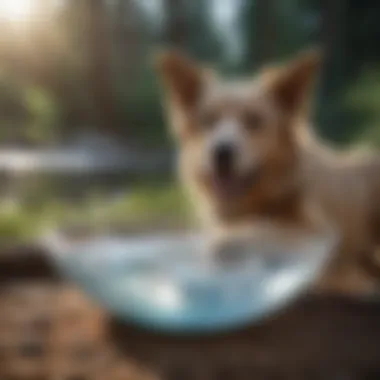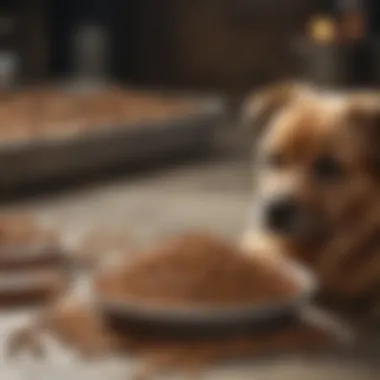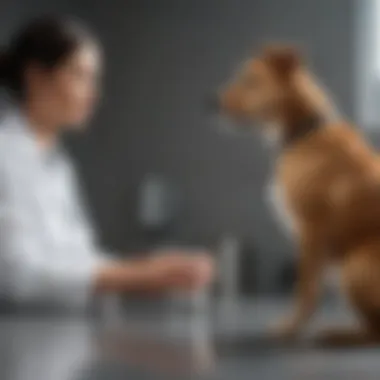Essential Diet Choices for Dogs with Diarrhea


Intro
Diarrhea in dogs can be distressing for pet owners. It often indicates underlying health issues that must be addressed. Understanding how to manage your pet's diet during such times is crucial. The right nutrition not only aids in recovery but can also prevent future occurrences. This article outlines recommended dietary practices for dogs experiencing diarrhea, focusing on hydration, soothing food options, and when to consult a veterinarian.
Understanding Your Pet
Breed Traits
Different dog breeds have varying digestive systems. Smaller breeds may experience diarrhea due to stress or dietary changes, while larger breeds might face issues from fast eating. It's vital to consider breed-specific traits when addressing gastrointestinal problems.
Common Temperaments
A dog's temperament can affect its eating habits. An anxious dog might eat less or refuse food entirely, while a more relaxed dog may consume meals quickly. Understanding your pet’s behavior will help you identify triggers for diarrhea and allow for better management.
Special Needs
Some dogs have special dietary requirements due to health conditions. Grain-free diets, for instance, are often recommended for breeds prone to allergies. Recognizing these needs is essential in tailoring a proper diet during digestion issues.
Pet Care Essentials
Nutrition and Feeding Guidelines
When facing diarrhea, it's crucial to adjust your dog's diet. Initially, fasting for 12 to 24 hours can allow the digestive system to rest. After that, gradually introduce bland foods, such as boiled chicken and rice. These options are easy to digest and can help firm up stools.
Recommended Foods:
- Boiled chicken (boneless and skinless)
- White rice
- Sweet potatoes
- Pumpkin (plain, not the spiced pie filling)
Grooming Tips and Techniques
Maintaining cleanliness is important during episodes of diarrhea. Regular grooming helps reduce the risk of infections, especially around sensitive areas. Keep your dog clean and dry to support healing.
Health and Wellness
Hydration is paramount. Encourage your dog to drink water frequently. If the diarrhea persists, pet owners should consider electrolyte solutions designed for pets. Keeping your dog well-hydrated will support overall recovery.
Training and Behavior
Basic Training Techniques
Training your dog to eat slowly can reduce the risk of digestive disturbances. Using a slow-feeder bowl can prevent fast eating, which may lead to more gastrointestinal issues down the line.
Behavioral Problems and Solutions
If your dog shows signs of anxiety or distress, calming techniques may help. Providing a safe space and comfort can alleviate stress that may trigger digestive issues.
Mental Stimulation Activities
Engaging your dog in gentle activities can help distract from discomfort. Low-energy games, such as puzzle toys or obedience training, can provide mental stimulation without straining their digestive system.
Engaging with Your Pet
Interactive Games and Toys
After recovery, gentle playtime can improve overall well-being. Interactive toys can keep your dog entertained while promoting mental engagement.
Safe Outdoor Activities
Short, controlled walks can aid in digestion. Fresh air and mild exercise can help restore normal activity levels once your pet's condition improves.
Family-Friendly Pet Interactions
Involving the whole family in caring for a recovering dog promotes socialization and comfort for the pet. This assistance can be beneficial during their recovery from diarrhea.


Pet Adoption and Integration
Choosing the Right Pet for Your Lifestyle
Understanding the dietary needs of different breeds can be essential when considering pet adoption. Some dogs may have specific dietary restrictions from the start.
Preparing Your Home for a New Pet
Before bringing a new dog home, ensure that you have appropriate food and feeding dishes that suit the dog’s needs. This preparation can make a smooth transition easier and mitigate potential digestive issues.
Tips for Smooth Prelims
When adding a new member to the household, gradual introductions can reduce stress. Proper nutrition is part of this transition, ensuring both pets can adapt well to any dietary changes.
Key Takeaway: The right diet significantly helps dogs recover from diarrhea and supports their overall health. Pay attention to their hydration and food choices during this time.
Effective pet care includes recognizing and addressing specific dietary needs. With proper management, pet owners can help their dogs navigate through these uncomfortable episodes.
Understanding Diarrhea in Dogs
Understanding the nature of diarrhea in dogs is crucial for pet owners. This condition can result from various factors that affect a dog's gastrointestinal tract. Recognizing the signs and causes of diarrhea can significantly impact the health of your dog. By grasping these elements, owners can make informed decisions about dietary adjustments and necessary vet consultations.
Causes of Diarrhea
There are many reasons why a dog might experience diarrhea. These include:
- Dietary indiscretion: Dogs often eat things they shouldn’t, leading to upset stomachs.
- Infections: Bacterial, viral, or parasitic infections can disrupt a dog’s digestive system.
- Food allergies: Some dogs react to certain ingredients in their food, causing diarrhea.
- Medications: Certain medications can upset a dog’s stomach as a side effect.
- Underlying health issues: Conditions such as pancreatitis, liver disease, or inflammatory bowel disease can also lead to diarrhea.
Identifying the cause is key to treating diarrhea effectively. Pet owners should observe their dog’s behavior and history to pinpoint the issue.
Signs to Monitor
Monitoring your dog’s condition during episodes of diarrhea is essential. Some signs include:
- Frequency of bowel movements: Increased urgency or number of trips outside can indicate a problem.
- Consistency of stool: Watery stool is a primary indicator of diarrhea.
- Behavioral changes: Lethargy or signs of discomfort should be closely watched.
- Physical symptoms: Vomiting, lack of appetite, or dry gums may signal additional health concerns.
If these signs coexist with diarrhea, it becomes necessary to consult a veterinarian. Early intervention can lead to better outcomes.
Importance of Diet During Diarrhea
The diet that a dog receives during episodes of diarrhea plays a crucial role in their recovery. This is not just a matter of comfort; it is about ensuring that the dog receives the necessary nutrients while minimizing gastrointestinal irritation. Choosing the right foods helps in reducing inflammation in the gut and promotes healing, making it essential for pet owners to understand the specifics.
Role of Nutrition
Nutrition is vital for any animal, and during diarrhea, it becomes even more significant. The gastrointestinal tract can become sensitive, and the wrong kinds of food may exacerbate the condition. Selecting easily digestible foods can help to restore normal gut function.
Using a bland diet is often recommended. Foods such as boiled chicken and white rice provide carbohydrates and protein while being gentle on the stomach. These ingredients are low in fat and do not possess spices or additives that could irritate the intestines.
In addition to aiding digestion, proper nutrition can support a dog’s overall health. A balanced approach ensures that pets receive essential vitamins and minerals needed for recovery. Supplements may be necessary in some cases, but these should only be provided under veterinary guidance to avoid complications.
Hydration Considerations
Alongside nutrition, hydration is a paramount concern during diarrhea. Loss of fluids can lead to dehydration, a serious condition that can worsen the dog’s health. Ensuring that a dog remains hydrated should be a top priority.
Encouraging water intake is essential, but it may not always be enough. For dogs whose diarrhea is particularly severe, low-fat broths or electrolyte solutions may be beneficial. These can help replenish lost minerals and provide additional liquid intake without overwhelming the digestive system.
Note: Always monitor the volume of fluids a dog consumes. If a dog refuses to drink, it is vital to consult a veterinarian as this could indicate a more serious underlying issue.
Maintaining hydration aids in the restoration of normal digestive function. It also helps in the overall absorption of nutrients when the dog returns to a regular diet. Pet owners should constantly assess their dog's hydration levels and respond promptly to any signs of distress.
Recommended Foods for Dogs with Diarrhea
Selecting the right foods for dogs that are experiencing diarrhea is crucial. Nutrition plays a significant role in helping restore the health of your dog’s digestive system. Foods that are easy to digest can provide the necessary nutrients while minimizing irritation to the gastrointestinal tract. Although diarrhea can stem from various sources, proper dietary choices can expedite recovery and improve your dog's well-being.


Bland Diet Essentials
Boiled Chicken
Boiled chicken is a highly regarded option for dogs battling diarrhea. Its main draw is that it is both lean and easy to digest. This simplicity allows the digestive system to process it without excessive strain. The protein in boiled chicken helps support recovery and maintain energy levels. It is important to avoid seasoning when preparing the chicken, as spices can exacerbate gastrointestinal issues. However, while beneficial, it is not a complete diet for an extended period, so it should be combined with other bland foods.
White Rice
White rice is another cornerstone for a bland diet. It acts as a binding agent that can help firm up stools. This food is good because it contains carbohydrates that provide quick energy without overwhelming the digestive system. Cooked properly, white rice can be easily mixed with boiled chicken, making it more palatable for the dog. Nevertheless, it should be noted that feeding exclusively white rice may not provide balanced nutrition over time.
Simple Pumpkin Puree
Simple pumpkin puree is often praised for its high fiber content. This fiber helps regulate the digestive system, making it a beneficial choice for dogs recovering from diarrhea. Pumpkin is soothing on the stomach and is also packed with vitamins and minerals. It is essential to choose plain pumpkin puree without additives or sugars. While effective, too much pumpkin can lead to other digestive issues, so moderation is key.
Low-fat Broth
Low-fat broth can be an effective way to maintain hydration and provide nutrition when a dog is unwell. It helps encourage fluid intake, which is crucial during episodes of diarrhea. The warmth of the broth can make it more appealing, especially to a sick dog. However, care must be taken to ensure that the broth is free of onions, garlic, and other harmful ingredients. It is primarily a supplement to regular food in circumstances of recovery rather than a permanent meal solution.
Commercial Solutions
Prescription Diets
Prescription diets are formulated specifically for dogs with sensitive stomachs. They incorporate ingredients designed to ease gastrointestinal distress. Veterinary-approved options often contain low levels of fat and high digestibility, which can be advantageous for dogs recovering from diarrhea. While these diets are effective, they typically require a vet's prescription.
Limited Ingredient Diets
Limited ingredient diets limit the types of ingredients to reduce the risk of food sensitivities. They typically use a single protein source and a few select carbohydrate sources. This can be helpful for dogs with known food allergies or sensitivities. The simplicity of these diets can ease the digestive load, providing a safe and digestible option during recovery.
Home-cooked Options
Plain Sweet Potatoes
Plain sweet potatoes are an excellent choice as they provide fiber and nutrients without causing digestive upset. Cooked and mashed, they are easy for dogs to consume and digest. Moreover, sweet potatoes contain vitamins like A and C, which contribute positively to the overall health of your dog. However, excessive consumption can lead to digestive issues, so balance is essential.
Quinoa as a Base
Quinoa can serve as a nutritious base for a home-cooked meal. It is a gluten-free grain rich in protein and fiber. Quinoa is also packed with vitamins and minerals, making it a beneficial option for dogs recovering from diarrhea. While it can be easily combined with other ingredients like chicken or vegetables, it is essential to introduce it gradually to monitor compatibility with your dog's system.
Foods to Avoid
Understanding what foods to avoid when your dog is experiencing diarrhea is crucial for recovery. Certain foods can exacerbate the condition, causing further irritation to the gastrointestinal tract. This section focuses on identifying these problematic foods, which helps dog owners make informed dietary choices. Avoiding specific items not only supports recovery but also contributes to long-term digestive health.
Common Triggers
High-fat Foods
High-fat foods can significantly affect a dog's digestive system, especially during periods of diarrhea. These foods often lead to increased gastrointestinal distress and may worsen existing symptoms. The key characteristic of high-fat foods is their unhealthy fat content, which can contribute to inflammation. This can be particularly damaging as the dog's system is already compromised. Therefore, it’s advisable to eliminate high-fat options, such as fatty cuts of meat or fried snacks, from their meals during recovery. The disadvantage is clear; while fat is a necessary nutrient in a dog's diet, excess intake during diarrhea can lead to additional health issues.
Dairy Products
Many dog owners mistakenly think dairy products are safe or even beneficial for dogs. However, the truth is that many dogs are lactose intolerant. The presence of dairy in their diet during diarrhea can lead to additional gastrointestinal upset. The high lactose content in products like milk and cheese can cause bloating, gas, and further diarrhea. Avoiding dairy not only helps in managing existing symptoms but also supports the dog's overall digestive health. It is essential to replace dairy with appropriate alternatives that are more suitable for dogs.
Raw or Undercooked Meats
Feeding raw or undercooked meats can pose a serious risk to dogs, especially those experiencing diarrhea. These products may contain harmful bacteria or parasites that can lead to further illness. The unique characteristic of raw meats is the potential for contamination. They often harbor pathogens like Salmonella or E. coli, which can exacerbate diarrhea and complicate recovery. Cooking meats thoroughly eliminates these risks and ensures safer consumption. For dogs undergoing recuperation, selecting fully cooked and digestible proteins is strongly recommended.
Human Foods Unfit for Dogs
Grapes and Raisins
Grapes and raisins are not just unhealthy; they are dangerous for dogs. Even small amounts can lead to severe gastrointestinal distress and, in some cases, kidney failure. The specific aspect of grapes and raisins that is harmful remains not fully understood, yet the risk is clear. As such, these foods must be strictly avoided when dealing with diarrhea. The unique danger they pose can outweigh any perceived benefits, making their presence in the dog’s diet unacceptable.
Onions and Garlic


Many people believe onions and garlic add flavor and nutrients to food, but they are toxic to dogs. Even small amounts can cause significant harm. These foods can damage red blood cells, resulting in anemia which can complicate recovery from gastrointestinal issues. It is crucial for dog owners to avoid these items completely. As we focus on feeding strategies during diarrhea, eliminating onions and garlic from the diet must be a top priority to ensure the dog's health and recovery.
Feeding Strategies During Recovery
Feeding strategies during recovery are crucial in helping dogs regain their health after experiencing diarrhea. Proper feeding not only aids in the healing process but also helps to restore normal digestion and balance in gut flora. This section focuses on two main aspects: gradual reintroduction of the regular diet and frequency of feeding. Both elements are important to ensure a safe and effective recovery.
Gradual Reintroduction of Regular Diet
When a dog's diarrhea subsides, it is essential to reintroduce their regular diet gradually. A sudden transition can overwhelm their digestive system, potentially leading to a recurrence of gastrointestinal issues. Therefore, start by mixing small portions of their usual food with the bland diet used during recovery. Over a week, slowly increase the proportion of regular food while decreasing the bland options. Here are some key points to consider:
- Observation: Monitor your dog for any signs of discomfort, and adjust the food ratios as necessary.
- Timeframe: A week is generally a good timeframe for gradual reintroduction, but every dog is different, so be flexible based on their responsiveness.
- Consistency: Stick to the same regular diet they had before the diarrhea, as abrupt changes can cause stress to their digestive system.
Frequency of Feeding
Adjusting the frequency of feeding may also be necessary during recovery. After experiencing diarrhea, dogs may not have a strong appetite initially. Hence, it is often beneficial to split their meals into smaller, more frequent portions rather than sticking to the usual two meals per day. Consider the following:
- Smaller Portions: Offer smaller amounts of food four to six times daily instead of the usual single or double servings. This ease the digestive burden.
- Stay Calm: Be patient if your dog decides to eat less; it’s only for a short period as their appetite returns.
- Hydration: Ensure that water is always available, especially as frequent feeding can lead to a need for hydration.
Feeding strategies must adjust according to your dog’s unique situation. Each dog will respond differently to changes in diet, requiring careful observation.
Implementing these feeding strategies significantly contributes to a smoother recovery for dogs suffering from diarrhea. By following a careful and patient approach, you can assist your pet in feeling better without the added stress of digestive setbacks.
Monitoring Your Dog’s Condition
Monitoring a dog's condition during episodes of diarrhea is vital. It helps pet owners track the severity and duration of the symptoms, allowing for informed decisions regarding treatment and dietary changes. Daily observation can uncover patterns or triggers that may not be immediately apparent. Furthermore, being attentive to your dog's overall attitude and behavior can indicate how they are coping. A calm yet alert dog may suggest improvement, while restlessness or lethargy could raise concerns.
Proper monitoring involves looking at several key elements. Keep a diary of your dog's eating habits, bowel movements, and general health. This can help in assessing recovery progress or if the condition worsens. Consistent attention can also assist in determining how dietary changes affect their recovery.
When you know your dog well, any deviation from their normal behavior stands out. This means you can spot potential issues early and address them swiftly. Quick action can often prevent more severe health problems in the future.
"Regular monitoring can make a significant difference in your dog's health outcome during diarrhea."
In summary, observing your dog's condition reveals important insights. Not only does it guide diet choices but it also sets a basis for when to seek veterinary help. Keeping a close eye allows for better management, which is essential during periods of gastrointestinal distress.
When to Consult a Veterinarian
Deciding when to consult a veterinarian is a pressing concern for many pet owners. Generally, if your dog's diarrhea persists for more than a day or two, it is wise to seek professional help. Additionally, if there are accompanying symptoms such as vomiting, blood in the stool, or signs of dehydration, make an appointment without delay.
A veterinarian can offer specific guidance tailored to your dog's needs. This may include recommended dietary changes or diagnostic tests to rule out underlying health issues. Routine check-ups become critical in these situations.
Signs of Serious Concern
Identifying signs of serious concern can help prevent further complications. Some indicators to watch for include:
- Persistent vomiting: This can lead to severe dehydration.
- Heavy lethargy: Indicating your dog may not be able to recover without intervention.
- Blood in the stool: This may signal a more severe condition requiring immediate care.
- Fever: A high temperature can be a sign of infection.
- Inability to keep food or water down: This can rapidly lead to dehydration.
When you notice any of these symptoms, it is essential to contact your veterinarian. Early intervention often leads to better outcomes. Remember, being proactive is always better than waiting until the condition worsens.
Preventive Measures for Future Episodes
Recognizing that diarrhea can significantly affect a dog's well-being, preventing future episodes is a vital consideration for pet owners. Understanding the factors that contribute to gastrointestinal distress is essential in keeping your dog healthy and happy. Preventive measures not only enhance the dog's quality of life, but they also reduce the likelihood of emergency visits to the veterinarian. By managing the dog's diet and hydration effectively, pet owners can lay the groundwork for better digestive health.
Regular Diet Management
Maintaining a regular, balanced diet is crucial for dogs, especially for those that have previously experienced diarrhea. A stable dietary routine helps in developing a healthy gut flora, which is integral for digestion. Here are some key aspects to focus on:
- High-Quality Ingredients: Choose dog food made with natural ingredients. Avoid fillers and low-quality animal by-products. Premium brands often offer better nutrition.
- Consistent Feeding Schedule: Feed your dog at the same time each day to establish a routine. This consistency aids in digestion and helps regulate the digestive system.
- Gradual Changes: If you need to switch to a new food, do it gradually over a week. This minimizes digestive upset by allowing the gut to adjust slowly to the new food.
- Portion Control: Monitor the quantity of food given. Overfeeding can lead to digestive stresses. Adjust portions based on your dog's age, weight, and activity level.
Implementing these strategies can significantly decrease the chances of diarrhea recurring, promoting overall digestive health in the long run.
Maintaining Hydration
Hydration is often underestimated, yet it plays a fundamental role in a dog’s health, particularly in preventing diarrhea. When dogs experience gastrointestinal issues, whether it is diarrhea or vomiting, the risk of dehydration increases rapidly. Therefore, ensuring your dog stays properly hydrated is paramount. Here are several effective strategies:
- Fresh Water Availability: Always provide access to clean and fresh water. It encourages your dog to drink, especially after episodes of diarrhea.
- Electrolyte Solutions: Consider using an electrolyte solution designed for pets. These can replenish lost fluids and minerals during recovery. Consult your veterinarian to choose the right product.
- Moist Food Options: Incorporate wet dog food or add water to dry kibble, which can increase fluid intake. Some dogs enjoy broth as a hydrating treat.
- Offer Ice Chips: For picky drinkers, offering ice chips can be an appealing way to encourage hydration.
By focusing on these hydration strategies, you can keep your dog’s fluid levels balanced, helping to prevent future gastrointestinal disturbances.
“Proper hydration and dietary management are key components in maintaining a dog's overall gut health.”



